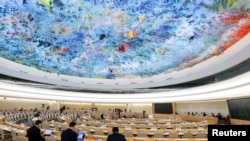The human rights records of more than 40 countries will come under scrutiny by the 47-member United Nations Human Rights Council during its upcoming four-week session.
The session promises to be extremely busy. Nearly 90 reports on a wide range of thematic issues will be presented. They include torture, enforced disappearances, the right to development, slavery, the rights of people of African descent and racism.
As in previous years, the council’s laser-lens focus on the way governments treat their people is expected to garner a lot of attention. Reported abuses, some amounting to crimes against humanity, will be examined in countries such as Myanmar, Belarus, Syria, Eritrea, Burundi, Nicaragua, and Venezuela.
U.N. High Commissioner for Human Rights Michele Bachelet will present an oral update on the situation in Afghanistan Monday as a follow-up to the council’s August 24 special session on that country. The European Union, Mexico and Britain along with human rights activists have criticized the resolution that was adopted for failing to establish a robust independent mechanism to monitor violations by the Taliban.
Council President Fiji Ambassador Nazhat Shameem Khan says discussion on Afghanistan has not ended with the special session.
“And, really, it is a matter for states to decide whether they want to take the outcome of the special session further and achieve another result," she said. "But I do want to note that the Security Council on the 30th of August adopted a resolution on safe passage. It addressed human rights concerns particularly as it relates to women and children.”
Human Rights Watch executive director Kenneth Roth says he is dismayed at the council’s reluctance to take on powerful countries such as Russia and China. He says he fears the Kremlin will not be held to account for its unprecedented crackdown on opposition parties in advance of this month’s parliamentary elections.
“Ideally, we would like to have a resolution. At minimum, there should be a joint statement. But, again, this is a situation that just because a government is relatively powerful, should not mean that it escapes scrutiny. And this is again a bit of a test of the council’s credibility,” he said.
Roth says the same dynamics are playing out regarding China’s abusive treatment of more than a million Uyghurs in internment camps in Xinjiang province.
“China has always escaped formal scrutiny by the council. There has never been a resolution on China. It is time to end that, given the severity and the atrocities, the crimes against humanity being committed in Xinjiang,” he said.
China maintains the Uyghurs are being held in reeducation camps and that the vocational training they are receiving is necessary to counter terrorism and alleviate poverty.
Roth is calling on Bachelet to present a report describing the inhumane conditions under which the Uyghurs are being incarcerated and to call for the Chinese government to be held accountable.




